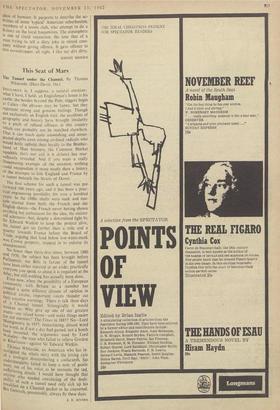This Seat of Mars
The Tunnel under the Channel. By Thomas Whiteside. (Hart-Davis, 16s.) INSULARITY is, I suppose. a natural emotion: . what I have, I hold; an Englishman's home is his castle; the hordes beyond the Pale: niggers begin at Calais—the phrases may be funny, but they represent strong and genuine feelings. Though not exclusively an English trait, the accidents of geography and history have brought insularity to a pitch of refined silliness in this country which can probably not be matched elsewhere. That it can reach quite astonishing and unsus- pected depths even among civilised radicals who would hotly uphold their loyalty to the Brother- hood of Man business, the Common Market squabble (let's not call it ft debate) has mar- vellously revealed. And if you want a really illuminating example of the emotion, nothing could encapsulate it more neatly than a history °f She attempts to link England and France by a tunnel beneath the Straits of Dover.
The first scheme for such a tunnel was put forward' 160 years ago, and it has been a prac- tical engineering possibility for over a hundred Years. In the 1880s shafts were sunk and tun- nels started from both the French and the English shores—the French never having shown anything but enthusiasm for the idea, the sinister old Schemers—but, despite a determined fight, by Sir Edward Watkin to keep the project alive, the, tunnel got no farther than a mile and a quarter towards France before the Board of Trade, arguing that land below low-water-mark waS, Crown property, stepped in to enforce its abandonment.
No fewer than thirty-five times, between 1880 and 1950, the subject has been brought before
have ten Bills in favour of the tunnel nave been either rejected or set aside;
. jtd id
practically everyone you speak to about it is impatient at the delay, but still nothing has actually been done. Even now, when the possibility of a European community with Britain as a member has created a quite different climate of opinion in Political circles, important voices thunder out their emotive warnings. 'There is talk these days of 'a Channel tunnel. Strategically it would weaken us. Why give up one of our greatest assets—our island home—and make things easier for our enemies?' The Times in 1885? No—Lord forbeen invented, the arguments used by Lord olseleY—the man who failed to relieve Gordon at Khartoum—against Sir Edward Watkin. __eflcbunlas Whiteside, an American who has in- Vo S Iga.ted the whole story with the loving care r da zoologist dismembering a coelacanth, ,haLQsea ndably failed to keep a note of gentle 1-13/ out of his voice as he recounts the sad, anyone details. I would have thought that abur,ne who needed convincing of the desk- bre'T of such a tunnel need only sick up his Bu,a,„'fast on a Channel packet to be converted.
presumably, always fly these days.
J. E. RIVERS










































































 Previous page
Previous page